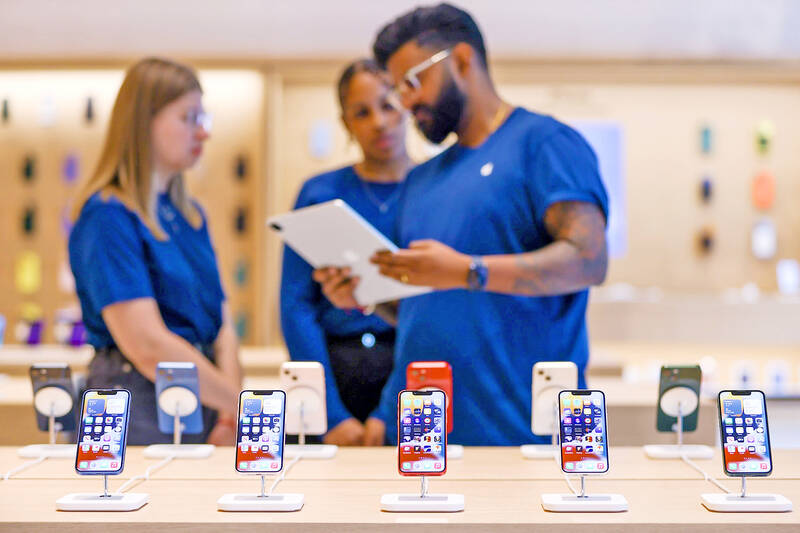Apple Inc has been barred from selling iPhones without a charger in Brazil and fined more than US$2 million over the issue, the Brazilian government said on Tuesday, after accusing the US tech giant of “discriminatory practices.”
In an official notice, Brazilian authorities ordered “the immediate suspension of the distribution of iPhone brand smartphones, regardless of model or generation, that are not accompanied by a battery charger.”
The Brazilian Ministry of Justice and Public Security ordered the California company to pay a fine of 12.28 million reais (nearly US$2.4 million).

Photo: Bloomberg
The measure from the Brazilian Department of Consumer Protection and Defense effectively prohibits the sale of all iPhone 12 and 13 models.
Apple has been under investigation in Brazil since December last year for “the sale of an incomplete product,” “discrimination against the consumer” and “the transfer of responsibility to third parties” by offering iPhone 12s and newer versions without chargers for power outlets, an official statement said.
The company has faced fines from Brazilian state agencies before, but “did not take any measures to minimize the harm and until now continued to sell the cellular devices without chargers,” the statement said.
Brazilian authorities said that Apple alleges that the decision to exclude chargers from iPhone sales comes from an “environmental commitment.”
However, the ministry determined “there is no effective demonstration of environmental protection on Brazilian soil as a consequence” of Apple’s policy, and accused the company of “deliberate discriminatory practices against consumers.”
“There is no justification for an operation which, in aiming to reduce carbon emissions, leads to the introduction into the consumer market of a product whose use depends on the acquisition of another [product] which is also marketed by the company,” the official notice added.
Apple plans to appeal the ban by Brazil, saying the company has helped reduce environmental waste by not including the accessory with new devices.
“At Apple, we consider our impact on people and the planet in everything we do,” the company said in an e-mailed statement. “Power adapters represented our largest use of zinc and plastic and eliminating them from the box helped cut over 2 million metric tons of carbon emissions — equivalent to removing 500,000 cars from the road per year.”
Apple said it would continue working with Brazil’s consumer protection agency to “address their concerns and plan to appeal this decision.”
“We’ve already won a number of court decisions in Brazil on this topic and are confident our customers are aware of the various options to charge and connect their devices,” the company said.
Additional reporting by Bloomberg

Semiconductor shares in China surged yesterday after Reuters reported the US had ordered chipmaking giant Taiwan Semiconductor Manufacturing Co (TSMC, 台積電) to halt shipments of advanced chips to Chinese customers, which investors believe could accelerate Beijing’s self-reliance efforts. TSMC yesterday started to suspend shipments of certain sophisticated chips to some Chinese clients after receiving a letter from the US Department of Commerce imposing export restrictions on those products, Reuters reported on Sunday, citing an unnamed source. The US imposed export restrictions on TSMC’s 7-nanometer or more advanced designs, Reuters reported. Investors figured that would encourage authorities to support China’s industry and bought shares

FLEXIBLE: Taiwan can develop its own ground station equipment, and has highly competitive manufacturers and suppliers with diversified production, the MOEA said The Ministry of Economic Affairs (MOEA) yesterday disputed reports that suppliers to US-based Space Exploration Technologies Corp (SpaceX) had been asked to move production out of Taiwan. Reuters had reported on Tuesday last week that Elon Musk-owned SpaceX had asked their manufacturers to produce outside of Taiwan given geopolitical risks and that at least one Taiwanese supplier had been pushed to relocate production to Vietnam. SpaceX’s requests place a renewed focus on the contentious relationship Musk has had with Taiwan, especially after he said last year that Taiwan is an “integral part” of China, sparking sharp criticism from Taiwanese authorities. The ministry said

US President Joe Biden’s administration is racing to complete CHIPS and Science Act agreements with companies such as Intel Corp and Samsung Electronics Co, aiming to shore up one of its signature initiatives before US president-elect Donald Trump enters the White House. The US Department of Commerce has allocated more than 90 percent of the US$39 billion in grants under the act, a landmark law enacted in 2022 designed to rebuild the domestic chip industry. However, the agency has only announced one binding agreement so far. The next two months would prove critical for more than 20 companies still in the process

CHANGING JAPAN: Nvidia-powered AI services over cellular networks ‘will result in an artificial intelligence grid that runs across Japan,’ Nvidia’s Jensen Huang said Softbank Group Corp would be the first to build a supercomputer with chips using Nvidia Corp’s new Blackwell design, a demonstration of the Japanese company’s ambitions to catch up on artificial intelligence (AI). The group’s telecom unit, Softbank Corp, plans to build Japan’s most powerful AI supercomputer to support local services, it said. That computer would be based on Nvidia’s DGX B200 product, which combines computer processors with so-called AI accelerator chips. A follow-up effort will feature Grace Blackwell, a more advanced version, the company said. The announcement indicates that Softbank Group, which until early 2019 owned 4.9 percent of Nvidia, has secured a